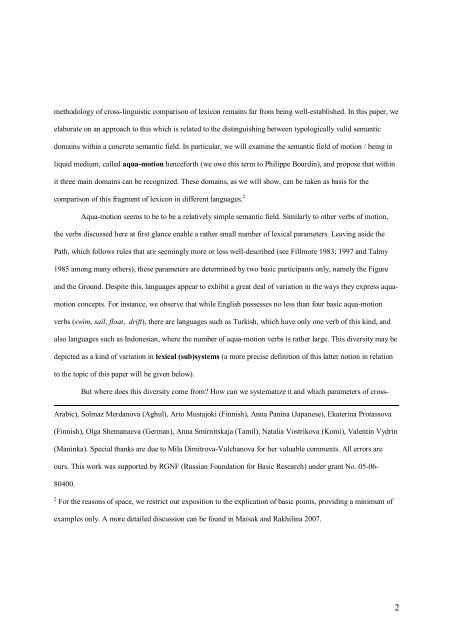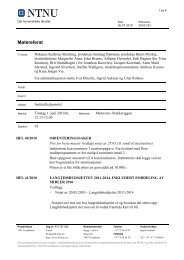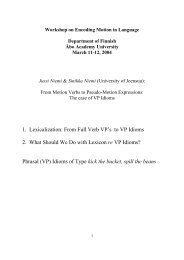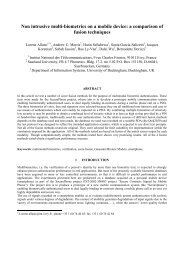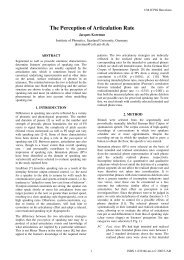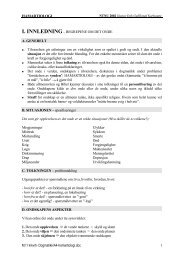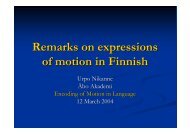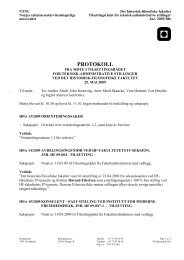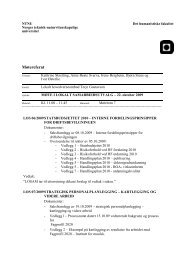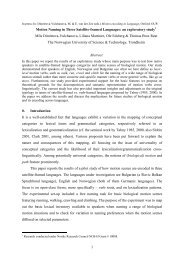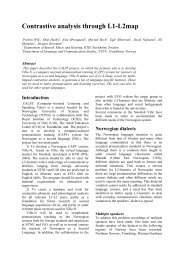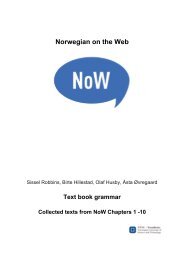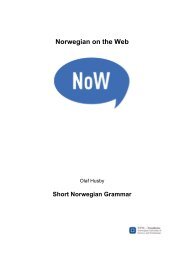Domains of aqua-motion: a case study in lexical typology Yury A ...
Domains of aqua-motion: a case study in lexical typology Yury A ...
Domains of aqua-motion: a case study in lexical typology Yury A ...
You also want an ePaper? Increase the reach of your titles
YUMPU automatically turns print PDFs into web optimized ePapers that Google loves.
methodology <strong>of</strong> cross-l<strong>in</strong>guistic comparison <strong>of</strong> lexicon rema<strong>in</strong>s far from be<strong>in</strong>g well-established. In this paper, we<br />
elaborate on an approach to this which is related to the dist<strong>in</strong>guish<strong>in</strong>g between typologically valid semantic<br />
doma<strong>in</strong>s with<strong>in</strong> a concrete semantic field. In particular, we will exam<strong>in</strong>e the semantic field <strong>of</strong> <strong>motion</strong> / be<strong>in</strong>g <strong>in</strong><br />
liquid medium, called <strong>aqua</strong>-<strong>motion</strong> henceforth (we owe this term to Philippe Bourd<strong>in</strong>), and propose that with<strong>in</strong><br />
it three ma<strong>in</strong> doma<strong>in</strong>s can be recognized. These doma<strong>in</strong>s, as we will show, can be taken as basis for the<br />
comparison <strong>of</strong> this fragment <strong>of</strong> lexicon <strong>in</strong> different languages. 2<br />
Aqua-<strong>motion</strong> seems to be to be a relatively simple semantic field. Similarly to other verbs <strong>of</strong> <strong>motion</strong>,<br />
the verbs discussed here at first glance enable a rather small number <strong>of</strong> <strong>lexical</strong> parameters. Leav<strong>in</strong>g aside the<br />
Path, which follows rules that are seem<strong>in</strong>gly more or less well-described (see Fillmore 1983; 1997 and Talmy<br />
1985 among many others), these parameters are determ<strong>in</strong>ed by two basic participants only, namely the Figure<br />
and the Ground. Despite this, languages appear to exhibit a great deal <strong>of</strong> variation <strong>in</strong> the ways they express <strong>aqua</strong><strong>motion</strong><br />
concepts. For <strong>in</strong>stance, we observe that while English possesses no less than four basic <strong>aqua</strong>-<strong>motion</strong><br />
verbs (swim, sail, float, drift), there are languages such as Turkish, which have only one verb <strong>of</strong> this k<strong>in</strong>d, and<br />
also languages such as Indonesian, where the number <strong>of</strong> <strong>aqua</strong>-<strong>motion</strong> verbs is rather large. This diversity may be<br />
depicted as a k<strong>in</strong>d <strong>of</strong> variation <strong>in</strong> <strong>lexical</strong> (sub)systems (a more precise def<strong>in</strong>ition <strong>of</strong> this latter notion <strong>in</strong> relation<br />
to the topic <strong>of</strong> this paper will be given below).<br />
But where does this diversity come from? How can we systematize it and which parameters <strong>of</strong> cross-<br />
Arabic), Solmaz Merdanova (Aghul), Arto Mustajoki (F<strong>in</strong>nish), Anna Pan<strong>in</strong>a (Japanese), Ekater<strong>in</strong>a Protassova<br />
(F<strong>in</strong>nish), Olga Shemanaeva (German), Anna Smirnitskaja (Tamil), Natalia Vostrikova (Komi), Valent<strong>in</strong> Vydr<strong>in</strong><br />
(Man<strong>in</strong>ka). Special thanks are due to Mila Dimitrova-Vulchanova for her valuable comments. All errors are<br />
ours. This work was supported by RGNF (Russian Foundation for Basic Research) under grant No. 05-06-<br />
80400.<br />
2 For the reasons <strong>of</strong> space, we restrict our exposition to the explication <strong>of</strong> basic po<strong>in</strong>ts, provid<strong>in</strong>g a m<strong>in</strong>imum <strong>of</strong><br />
examples only. A more detailed discussion can be found <strong>in</strong> Maisak and Rakhil<strong>in</strong>a 2007.<br />
2


